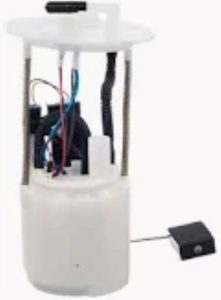Mechanical fuel pumps work by utilizing the motion of the engine to lift a diaphragm, generating a vacuum that sucks up petrol from the tank to feed into the carburetor. The pump operates via a lever that connects the diaphragm to the engine's camshaft. When the camshaft spins, the lever pushes and pulls on a diaphragm that creates alternating suction and pressure. In this cycle, the fuel flows from the tank to engine. For most applications, mechanical fuel pumps are a universal and low pressure pump, usually 4-6 psi, which is just fine for carbureted engines that don't require the high-pressure returns of today's fuel-injected systems.
For older vehicles, like a 1967 Chevrolet Camaro or 1970 Dodge Charger, the basic mechanical fuel pump works as it has for decades and is perfect for anything with less than 300-horse. Flow rates for use with carbureted engines are achieved with pumps capable of supplying a maximum throughput of around 30-40 gallons per hour (GPH) depending on engine needs. In performance applications, this means electric pumps rated at up to 300 liters per hour (LPH) face off against mechanical alternatives simply because the OEM-spec primary pump is no longer able to keep pace with power increases.
Due to the engine speed and load that impacts the efficiency of mechanical fuel pumps. The camshaft speeds up as the engine rpm increase, which in turn increases rotation speed of the pump and thus diaphragm motion. Thus, the fuel flow increases with engine RPM in order to keep supplying a consistent amount to the carburetor. Thankfully, where a mechanical pump typically begins to fail is something of a graduated curve, so it may still supply enough fuel to idle an otherwise stock or lightly modified engine. But if the engine is modified in just about any way--or even worse, if you've added a power-adder like turbo- or supercharging--a mechanical pumps often can't offer the flow required to keep up with demand, leading to lean-out conditions and potential damage.

They are cheap and reliable which can last gallons and gallons of fuel unless the vehicle is alive for more than 100,000 miles if driving under normal conditions. Despite their expense, I love mechanical pumps because they cost between $50-$100 instead of some electric fuel pumps that can top the 200 dollar mark. So restoring a classic car with a mechanical pump may represent significant fuel system cost savings vs. installing modern electric pumps and their wiring, etc.
Mechanical fuel pumps, while durable, will eventually wear out and disassemble from the many components driving its operation whether from contaminants that collect in the fuel or simply after so many cycles of exposure to debris. Routine maintenance can also have a role in the longevity and effectiveness of the pump like replacing the fuel filter every 30,000-50,00 miles. If the fuel pump fails, you will have a hard time getting started, losing fuel pressure or choking it high speed.
To learn more about mechanical fuel pumps operation or pick the best Fuel Pump upgrade, you can check the link above which will lead you to different pump models suitable for your vehicle.